2018 Nissan Titan XD Crew Cab Platinum Reserve Diesel 4x4
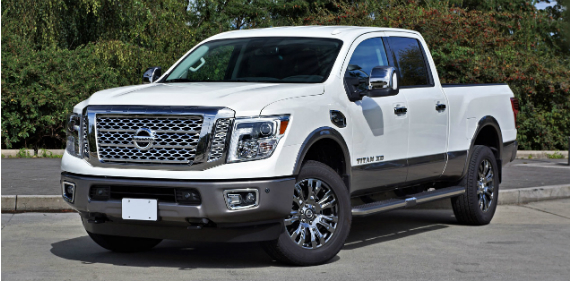
Anyone still questioning whether the full-size pickup truck market is a tough nut to crack for imports hasn’t been paying attention.
Toyota has arguably done a better job than Nissan over the long haul, although when comparing deliveries to the big three we’re talking baby potatoes either way. Toyota sold 116,285 Tundras to 52,924 Nissan Titans in 2017, whereas Ram sent 500,723 Pickups down American roads last year, General Motors improved on that number with 803,807 Chevy Silverado and GMC Sierra deliveries, and Ford once again topped the charts with 896,764 F-Series sales.
Despite a fairly tough year in the U.S. automotive market, every one of those truck-makers saw year-over-year growth, with Ram achieving its best full-size pickup sales ever despite mere 2.3 percent growth from the year prior. That said, none of the others came anywhere near their best-ever totals, with F-Series sales growing 9.2 percent from 2016 to 2017, Silverado/Sierra up 0.9 percent, Tundra up 0.7 percent, and (wait for it) Titan sales up 141.9 percent. If you think that’s good, that number grows to 335.9 percent growth when comparing 2015 calendar year sales to 2017, so it’s safe to consider the Titan a success even with its last-place finish. All we need to do is factor in a totally new Titan XD model in 2016 and then the availability of the new-for-2017 gasoline-powered half-ton version last year and it all starts making sense.
Yes, this Cummins Diesel-powered Titan XD arrived on the market two years ago, and while it did well such big heavy-half pickup trucks aren’t for everyone. Then again the Titan XD makes a lot of sense for trailer-pulling folks, whether the load is construction equipment or landscaping fill for your business, or personal recreation gear like a camper, boat or horses. The truck I tested was capable of 12,030 lbs of trailering weight and a payload of 2,000 lbs (max payload is 2,520 lbs), and can even be had with a Nissan-sourced fifth-wheel hitch integrated into the bed. Want to check your trailer’s lights once it’s hooked up? The Titan team has thought of everything, providing you opt for second-rung SV trim (or higher) with its standard key fob actuated trailer light tester.
My top-line XD Platinum had that familiar highway rig look thanks to copious chrome detailing, most notably across the front grille, the rear tailgate, the mirror caps, door handles, alloy wheels, and various trim bits. It’s a darkened chrome for a richer look, softened slightly by my tester’s Pearl White and taupe gray Titanium metallic two-tone effect paint, yet still pretty glitzy for the campground crowd.
Let’s face it. When driving up in a Titan you’re not going to enjoy the camaraderie of F-Series owners wandering over from the adjacent campsite to see the latest Limited, or for that matter the Silverado/Sierra bunch fawning over the newest High Country/Denali, let alone the Ram gang making googly eyes at the Laramie Limited. You’ll get the odd curious albeit wary wonderer trying to get a closer look at what’s available from the dark side, unaware the Titan is made in the good ‘ole U.S.A., Canton, Mississippi to be exact.
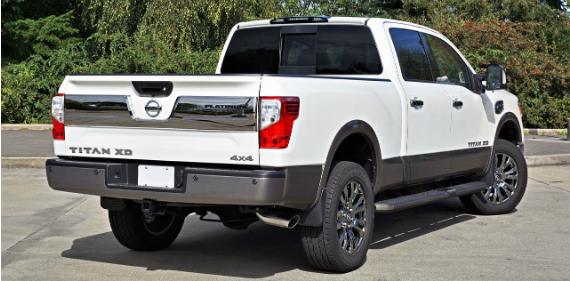
Be prepared for some deep frowns from heavy-duty Ram fans who think their HD 2500 and 3500 models have an exclusive right to Cummins Diesel power. The Columbus, Indiana company supplies both brands now, but don’t go spouting off engine output numbers or you’ll put smiles right back on their faces, being that the Titan XD Cummins Diesel doesn’t put out anywhere near the performance of the Ram HD, the domestic truck’s 16,320-lb tow rating the result of a 6.7-liter I-6 with 410 horsepower and 800 lb-ft of torque. It appears not all Cummins diesels are created equal.
Of course, the Titan XD isn’t a three-quarter or one-ton pickup truck, and therefore doesn’t need as much capability. Most should find the 310 horsepower and 555 lb-ft of torque from its DOHC, 32-valve Cummins 5.0-liter V8 equal to their requirements, while many will be just as satisfied with the 390 horsepower and 394 lb-ft of torque from the base 5.6-liter gasoline-powered V8, an engine that wasn’t available for the 2016 launch model.
On that note Nissan hasn’t made any changes for 2018, other than pricing that’s increased from $31,590 to $32,040, plus freight and fees of course. Three body styles carry forward, including Single Cab, King Cab and Crew Cab, with 4x2 and 4x4 variants available across the line, whereas trims also remain unchanged, including S, SV, SL, and Platinum Reserve, while each can be had with either gasoline or diesel powerplants.
No matter which engine you choose features are the same, but keep in mind S trim is pretty basic. Its standard pushbutton ignition is a bit of an upscale surprise, as is the dampened-assist tailgate, but bringing it back down to earth are 17-inch steel wheels, manually adjustable side mirrors, and a smallish 5.0-inch display audio system with AM/FM/CD audio. At least it gets standard remote keyless entry, cloth upholstery instead of vinyl, a nice 40/20/40-split front bench seat with a flip-down armrest, a 60/40-split fold-up rear bench seat (Crew Cab), tilt and telescopic steering, variable intermittent wipers, a RearView parking monitor, Bluetooth phone connectivity with audio streaming, aux and USB ports, six-speaker stereo, overhead LED cargo bed lights, hill start assist, tire pressure monitoring, and more.
The move up to SV, which costs $35,940 with gas or $41,990 with diesel, plus an extra $1,970 for the King Cab or $5,200 for the Crew Cab, swaps out the S model’s basic looking black grille and front/rear bumpers for chrome, while also adding fancier manually-extendable tow mirrors with power-adjustment, heat, integrated turn signal indicators and puddle lights, carpeting instead of Easy Clean Vinyl flooring, an Advanced Drive-Assist Display within the gauge cluster, satellite radio, a front overhead storage console, a skid plate for the fuel tank (4x4 models), trailer sway control, a Class IV tow hitch receiver with four-pin/seven-pin wiring, a trailer brake controller and the aforementioned trailer light check, an integrated gooseneck hitch, and front tow hooks.
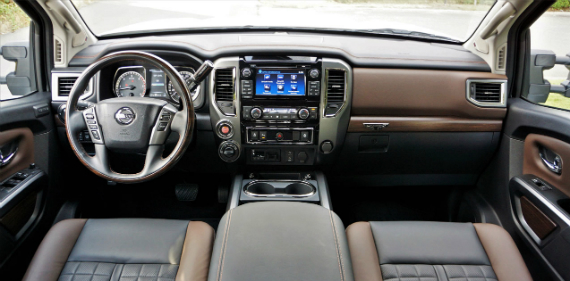
The Pro-4X, at $48,130 with gas or $53,380 with diesel, which comes standard with the Crew Cab and 4WD, is Nissan’s sport truck with body-color paint where chrome would normally go, a nicer cabin featuring embroidered and contrast-stitched upholstery, lots of satin-silver interior trim, higher-end features like auto on/off signature LED headlights, LED daytime running lights, fog lights, proximity access, a leather-wrapped steering wheel, rain sensing wipers, front bucket seats, a front center console, an eight-way power-adjustable driver’s seat with powered lumbar support, dual-zone auto climate control, a larger 7.0-inch color infotainment touchscreen, navigation, voice recognition, Siri Eyes Free, NissanConnect Mobile Apps, SiriusXM Traffic and Travel Link, blindspot warning with rear cross-traffic alert, a center console-mounted 120-volt power outlet, and rear A/C vents, plus handy conveniences like a lockable rear seat cargo organizer, and a factory-applied spray-on bedliner, not to mention unique trim-specific off-road equipment such as its electronically-controlled locking rear differential, hill descent control, Bilstein performance shocks, 18-inch alloys wrapped in beefy all-terrain tires, and yet more skid plates for the oil pan, transfer case and lower radiator.
Much of the Pro-4X’ non-sport/off-road related gear gets pulled up to SL trim, which starts at $49,410 for the gasoline model and $54,660 for the diesel, and then is added upon with niceties like 20-inch silver-painted alloys, a fully chromed grille, chromed bumpers, mirror caps, and door handles, illuminated running boards, remote engine start with Nissan’s Intelligent Climate Control, an auto-dimming rearview mirror, an auto-dimming driver’s side mirror, a HomeLink universal garage door opener, woodgrain trim, leather upholstery, a powered tilt and telescopic steering column, memory for that steering column, the driver’s seat, and side mirrors, a four-way powered front passenger’s seat, heatable front seats, 12-speaker Rockford Fosgate audio, NissanConnect/SiriusXM Services, front and rear parking sensors, a power-sliding back window, LED under-rail bed and tailgate area lighting, Nissan’s Utili-track Channel System with four tie-down cleats, a bed-mounted 120-volt AC power outlet, and more.
Lastly, top-line Platinum Reserve trim, which starts at $54,780 for the gasoline model and $60,030 for the diesel, adds the dark chrome mentioned earlier, two-tone paint, a chrome exhaust finisher, metallic kick plates, a heatable steering wheel rim with woodgrain accents, reverse tilt-down for the side mirrors, a 360-degree AroundView parking monitor, premium open-pore woodgrain trim, premium two-tone leather upholstery, climate-controlled (cooled) front seats, heatable rear outboard seats, upgraded floor mats, a gooseneck ball and anchor kit, plus more.
All of these upscale features come in a cabin that’s finished very well, with more soft touch synthetic surfaces than a fully loaded F-Series or Tundra, yet not quite as much as provided by top-line Ram or GM trucks. Where my previous Pro-4X tester was filled with cold hard blacks, whites and silvers, the Platinum gets warm brown tones with stylish orange threading and authentic looking woodgrain tastefully applied in key areas. The seat upholstery was quite stunning actually, trimmed in a lighter camel brown on the bolsters plus a darker perforated and quilted brown leather at center, while the driver’s multi-adjustable capability made it especially comfortable, and the steering column’s extensive power reach allowed for ideal ergonomics.
Ahead of that steering wheel is a classy looking two-dial analog gauge cluster featuring a fairly large color multi-information display in between. Over on the center stack, the infotainment touchscreen incorporates an excellent split-screen parking monitor with a traditional rearview camera on the left and an overhead 360-degree view to the right. The navigation system proved easy to use and accurate as well, while that Rockford Fosgate audio system mentioned earlier definitely cranked out the tunes. Overall, the center stack is well laid out and all of the switchgear quality was on par for the class, but nothing to write home about.
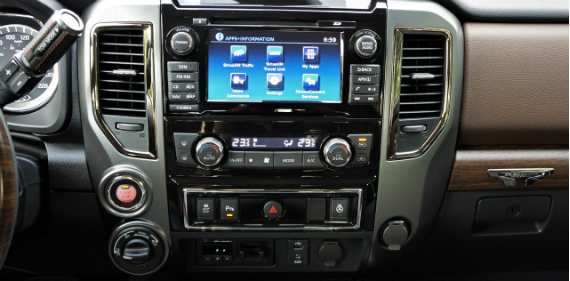
Storage is worthy of a quick note, mind you. Up front are the usual cupholders, but take note they slide back and forth above a large open bin that’s filled with a removable rubber mat for easy cleaning, while the leather armrest/bin cover just behind sits above another large and accommodating bin with its own removable tray, not to mention various connectors, while an aux plug, USB port, and 12-volt charger take care of devices at the base of the dash. As good as that sounds, this truck could use more USB ports and even a wireless charging pad to keep it current. I appreciated the sunglasses storage in the overhead console just the same, despite its strangely oversized nosepiece holder that caused eyewear to flop around inside, a Nissan brand-wide oddity.
I was impressed with the rear seating area as well. While it’s large and spacious for passengers, the seatbacks also fold flat to store items on top, although flipping them upwards and then folding out the optional rear flat load floor’s carpeted extension is even more useful. It provides a large flat loading area where the seats had been, perfect for storing your belongings safely inside when traveling or on the job site.
Those side steps mentioned earlier make climbing up to reach over the box walls into the back quite easy, but clambering up to the bed when the tailgate is lowered is difficult for someone small of stature or on in years. Nissan only provides a tiny patch of hard plastic at each corner of the bumper to rest the tip of your boot before swinging upwards, which as anyone who’s lived with trucks knows is a painful slip and fall waiting to happen. Fortunately you can get kick-down steps by opting for the $750 Platinum Reserve Utility Package, which also includes an electronic tailgate lock and Titan Boxes, the latter being storage boxes that fit overtop the rear wheel wells. This said, both import manufacturers really need to catch up to the domestics when it comes to bed access, GM especially good in that it provides standard steps integrated within the corners of its rear bumpers.
The bed rail system noted earlier works well for tying down cargo, but when it comes time to clean up it’s very challenging to get sticks and debris out from underneath each rail with a regular broom. Likewise the spray-in bedliner was like sandpaper, holding firm to flakes of grass, twigs, and all the other things that get attached after hauling a load or simply parking under a tree, so I’d recommend investing in a power washer if you like to keep your rig clean. Fortunately the grippy surface is an ultra-safe way to make sure you don’t slip and fall in the rain, so I shouldn’t complain.
Whether you’re jumping around on the bed, slamming the tailgate shut, doing likewise to the doors, or driving over bumps and dips, the Titan feels as solid as half-ton pickups get, with zero wiggles or creaks in the cabin or anywhere else. It helped that no sunroof was included, which I thought was a bit strange in a top-line truck. This wouldn’t be an issue if Nissan made one available, but alas sun worshipers and stargazers will have to choose another brand if they want a glass roof overhead.

The Titan also comes up short on advanced driver assistance systems, such as forward collision warning, autonomous emergency braking, lane keeping assist, adaptive cruise control, auto high beams, and the list goes on. Nissan has all of the above and much more in its parts bin, but so far these haven’t made it to this Titan XD or the lighter weight Titan.
Working to the Titan XD’s advantage is a wonderfully smooth ride, rock steady high-speed cruising ability, and decent at the limit handling, which are all important in a truck with such immediate and plentiful performance. Yes, its big Cummins V8 gets up and goes with gusto, its Aisin-sourced six-speed automatic one gear off the pace when compared to the gasoline-powered Titan, and more so when put up against its domestic rivals, but still a smooth operator and reasonably quick through the cogs. I didn’t get to play with the XD in the mud either, so no opportunity to test its four-wheel drive, which incidentally uses a switch-operated two-speed transfer case. I tested its basic functions on pavement, and can attest to its ultra-easy actuation from 2Hi to 4Hi and 4Lo modes via a dial on the instrument panel, but that’s about it.
Considering its heavy-half, five-eighths capability you shouldn’t expect the same level of performance found in the lighter Titan or one of its half-ton peers, nor will you find its ride as smooth as either, but then again it’s a bit less of a bruiser than its domestic three-quarter and one-ton rivals, finding a happy medium between the two classes. Also, its double-wishbone front suspension and solid axle/multi-leaf rear setup with stabilizer bars at both ends is more traditional than the coil-sprung Ram, although the Titan’s classic setup is preferred by most towing and hauling fans.
The Titan XD Diesel manages impressive fuel economy too, but being larger than its half-ton sibling it qualifies as a commercial truck and therefore doesn’t need to report mileage info. I can’t even give you an official guestimate by converting another market’s specs, because the same non-rules are in effect elsewhere. After my week’s near equal city/highway driving, most of which was easy-going in order to save fuel (I was responsible for filling it up after all), I achieved an average of 17.5 mpg. That’s very good, but of course expected from an advanced turbo-diesel pulling nothing but its own bodyweight. Factor in that diesel fuel is regularly priced about much less than regular unleaded in my part of the woods, and that a diesel-powered vehicle can travel up to 30-percent farther on a tank of fuel, the Titan XD makes a lot of sense even with its $5,550 upcharge.
Whether or not the Titan is capable of pulling its own weight from a business case perspective is still open to question. It’s certainly finding new buyers at a rapid rate, and despite lagging behind the Tundra and all domestics in sales, it’s a stronger seller than some other Nissan models and all Infinitis, while its long-term potential is too good to pass up.
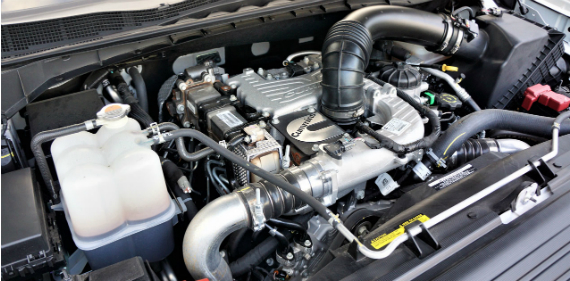
No other vehicle class on the market boasts models selling into high six-figure territory. That’s why Nissan and Toyota stepped into the full-size pickup arena in the first place, and why they’ll likely stick it out over the long haul. Just the same, automakers like Hyundai and Volkswagen might want to hold back before entering the fray, as the cards are stacked against success in this segment. It’s not just about building a worthy full-size pickup truck contender, as Nissan has learned, because breaking through brand loyalty barriers has proven difficult enough for those already steeped in compact pickup heritage, let alone carmakers that have never offered a serious truck in our market.
The Titan might be the most credible import offering to date, hitting at the core of the full-size half-ton market, and even creating its own unique niche by taking a half-step up on every competitor with this innovative five-eighths, heavy-half Titan XD. Now with a more complete line of engines, it’s a force to be reckoned with and therefore should slowly, steadily pull buyers into its alternative camp.
*Story credits: Trevor Hofmann, American Auto Press Photo credits: Karen Tuggay, American Auto Press Copyright: American Auto Press *
